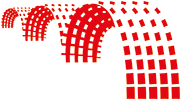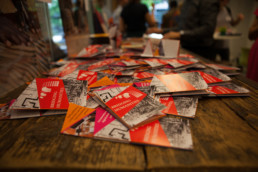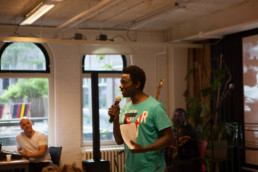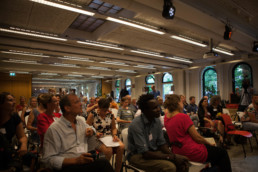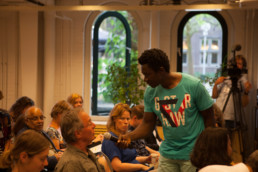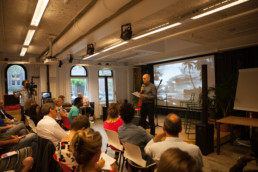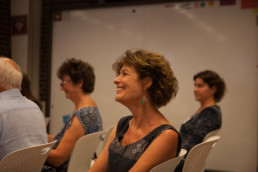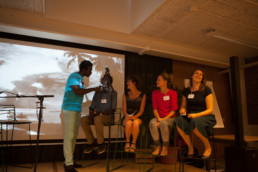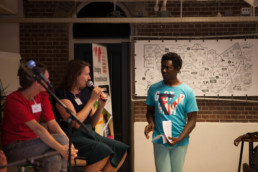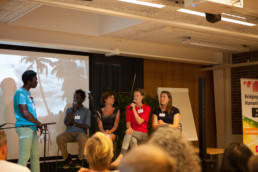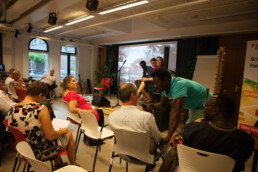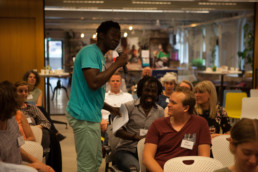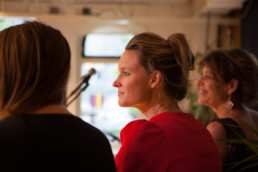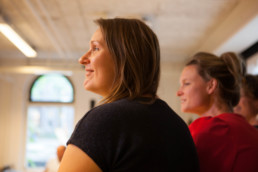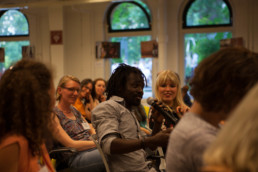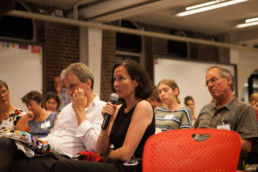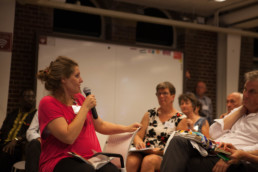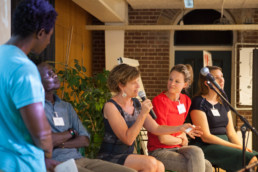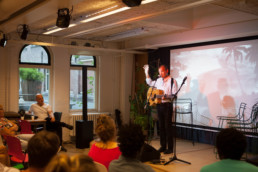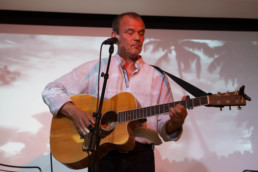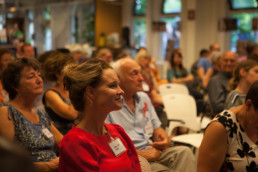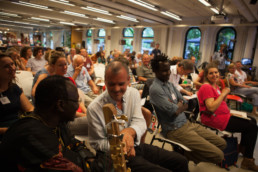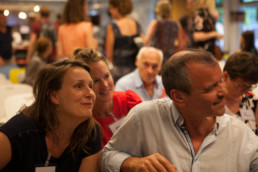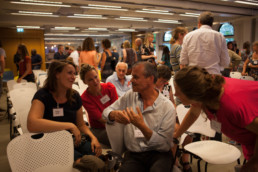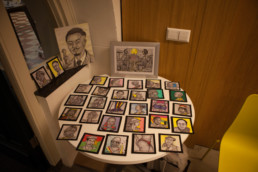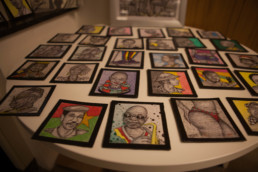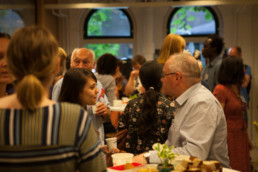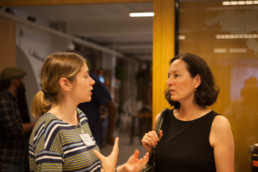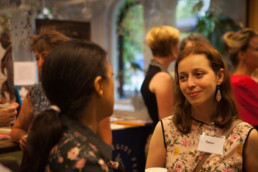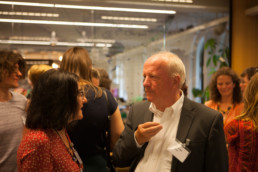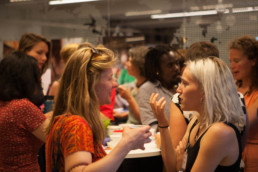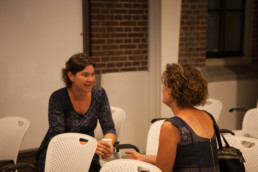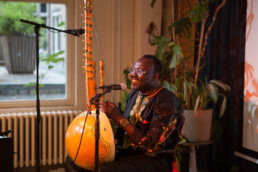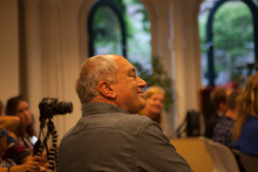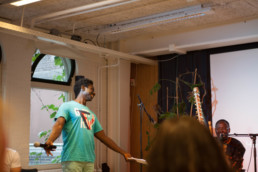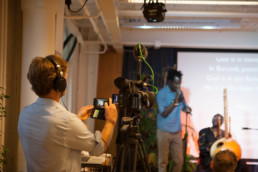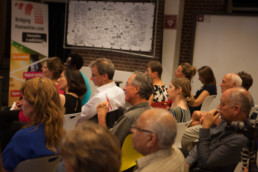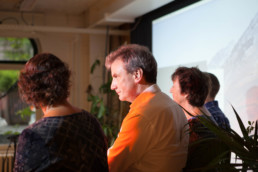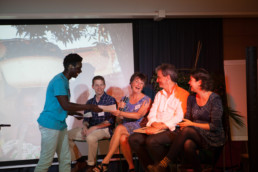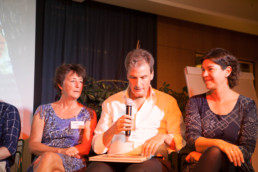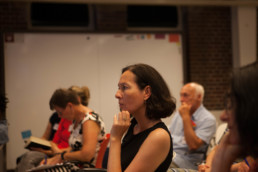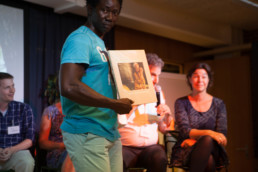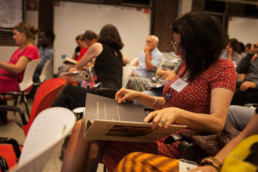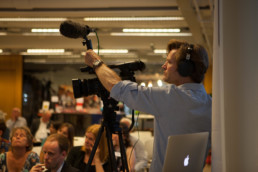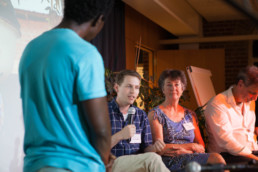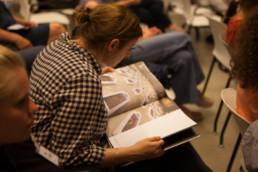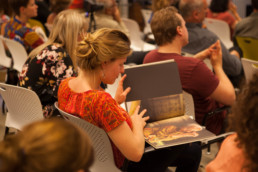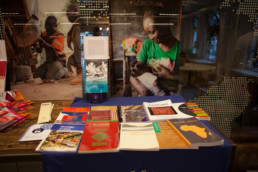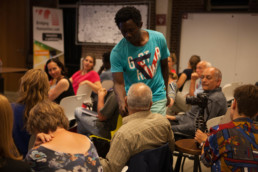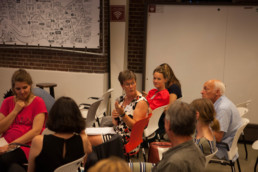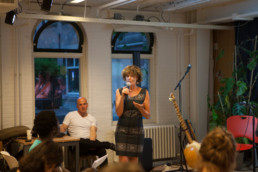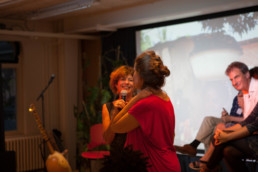Launch meeting Bridging Humanities
Knowledge is power, but who has the authority to claim knowledge? Western based academic knowledge is often characterised by unseen conditions of inequalities that have a long (and in many cases colonial) history. Should we therefore ‘decolonise knowledge’? Or in other words, should we open up academic knowledge production for new voices that are normally not easily heard?
The digital environment may bring opportunities to democratise knowledge production and to integrate different knowledge layers. Can more creativity and flexibility in online academic publishing, counterbalance the negativity that is related to the digital in times of ever greater control on online behaviour and ‘enslaving algorithms’? How can Bridging Humanities offer such a space in an open access and sustainable format?
These were the issues discussed during the launch meeting of Bridging Humanities on 7 June 2018 at the Impact Hub in Amsterdam. An evening of debate and artist performances, facilitated by writer and journalist Babah Tarawally.
This is a short impression video of the meeting. Below we report on the meeting in text and short edited videos that cover the different topics that were discussed. The full archive of the meeting can be found on the Youtube channel of Voice4Thought.
Film editing by Sjoerd Sijsma (Voice4Thought/Eyeses), film editing and texts by Kim de Vries (Bridging Humanities)
This video is an introduction to what Bridging Humanities entails. You can also watch the full introduction by Joed Elich and read the text of his speech.
Towards new knowledge production processes
Joed Elich of Brill publishers opened the evening by stating that Western academic knowledge is drenched in false assumptions and that true decolonisation of knowledge was needed for the destiny of human kind. Brills decision to publish Bridging Humanities was taken out of concern that it could contribute to a critical look at the power of knowledge, the ways it is monetised, archived, restricted and monopolised. Advisory board member Paul Vierthaler (Leiden University Centre of Digital Humanities) later added to the panel discussion that Bridging Humanities could contribute new knowledge to archives that would otherwise keep reflecting the existing power structures.
Co-creation: the value of bringing in other knowledge sources
One way to break existing hierarchies and open up academia is through co-creation, the collaboration between academia and other knowledge producers such as artists. A process in which ‘two sets of ideas meet’ as Catharina Wilson from the audience put it. The participants could experience the power of co-creation through the performances of Dutch musician Ernst Jansz and Chadian artist Croquemort, who have been involved in the first two publications of Bridging Humanities (see below).
While the authors explained the artists have added new dimensions to their research, the artists also explained how their involvement in the research projects had inspired them to create new work or to look at matters in new ways.
Bridging Humanities is also involved in innovation of education and will publish projects such as that of Sapin Makengele, who collaborated with students and made a drawing on the Congo-Crisis [see his project here].
Digital developments and new languages
Panel member Kitty Zijlmans (Art History, Leiden University) made a strong case for creativity and the input of artists, who as no other group have the ability to make things tangible. She also advised to look into collaboration with technicians and engineers to make better use of digital means and not become slaves of algorithms. Panel member Geesje van Haren (founder of the journalistic platform Verspers) added that a lot of technical innovations come from the Global South, and that we must keep in sight which technological developments take place there.
What has become clear is that co-creation requires the learning of new languages, in order to collaborate with others and not to lose content. To what sorts of publications this can lead, as well as the standards for evaluating and reviewing this new type of academic output, needs further discussion.
The projects that were presented
Maartje Janse, Anne-Lot Hoek, and Ernst Jansz were interviewed on their collaboration for the publication ‘Dissenting Voices: Challenging the Colonial System’.
Ernst Jansz also performanced two songs during the meeting: ‘De ballade van Sarina and Kromo‘ (‘The ballad of Sarina and Kromo’), which he wrote for the publication, and ‘De naakte Waarheid‘ (‘The Naked Thruth’)’.
Mirjam de Bruijn and Croquemort were interviewed on their publication ‘Croquemort: A biographical journey in the context of Chad’.
Croquemort performanced two slams during the meeting, and was guided by kora player Jalli Lamin Kuyateh: ‘Les cieux on brulle’ (‘The skies set fire’), and ‘Dans mon quartier’ (‘In my neighborhood’).
Full registrations of the panel discussion, the discussion with the audience, and the reflection of Advisory Board Member Inge Brinkman are archived.
Decolonisation of knowledge, a Western need?
Not everyone agreed with the assumed need for ‘decolonisation of knowledge’. Jan-Peter Wissink, Director of Amsterdam University Press, warned us that the term suggested a reference to a specific period in history, which would deny the agency of non-western actors and the existence of a South-South dialogue. Journalist Anne-Lot Hoek, author of the upcoming publication on the colonial system in the Dutch East Indies, had earlier made the point that attention for ‘decolonisation’ and ‘decolonisation of knowledge’ are two different things. However, she referred to the way the two concepts are interlinked, as can be illustrated by the perceptions on the Dutch funded decolonisation research on Indonesia. By using the term, the Indonesians have argued that the focus of the research denies the Indonesian fight for independence. Professor Mirjam the Bruijn also argued in her concluding words [archived here] that the linkage between the two concepts is existing and can be seen in the protest movements like Rhodes must fall. Initially a fight against institutional racism, later growing out to general protest against the university set up with a focus is on quantity rather than quality of education.
Open Access: How to ensure sustainability of the platform?
Bridging Humanities attempts to remain Open Access. From a publisher’s perspective, a journal needs to be sustainable and therefore be set up with a business perspective in mind. Jan-Peter Wissink urged Bridging Humanities to think of a business model, something that is often not naturally addressed by the Open Access community. Kitty Zijlmans added to this that sustainability will also be defined by the diversity of knowledge producers and users that will be found on the platform. Open Access in itself has the advantage that it may lead you to find things that you might not find otherwise. In that sense it is important to also let the platform truly function as an open platform, not restricted to certain academic disciplines or topics of research.
